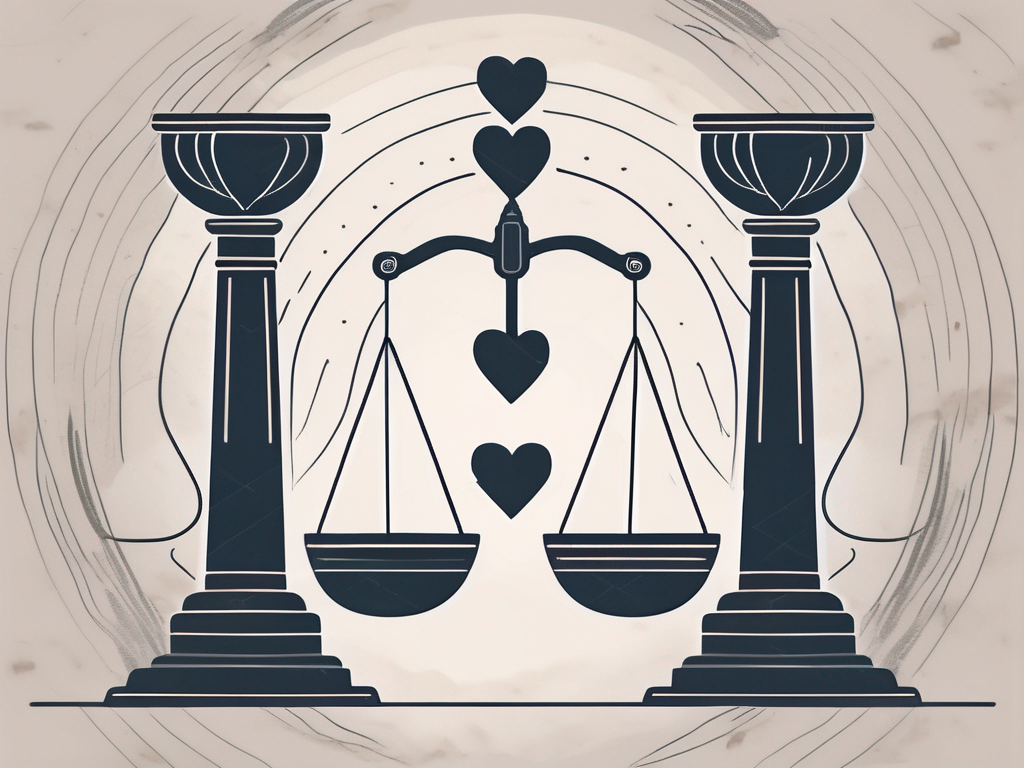Anger, a powerful and intense emotion, can often lead to destructive consequences if left unchecked. However, the ancient philosophy of Stoicism offers a valuable approach to mastering emotional control. By embracing Stoic principles, one can gain a deeper understanding of anger and learn effective techniques for managing and overcoming it. In this article, we will explore the core principles of Stoicism, delve into the Stoic perspective on anger, and discuss practical strategies for applying Stoicism in everyday life. Let’s embark on a journey towards emotional well-being and discover the benefits of adopting a Stoic approach to anger.
Understanding Stoicism: A Brief Overview
Before diving into the specifics of Stoicism’s approach to anger, let’s take a moment to understand the philosophy itself. Stoicism originated in ancient Greece and later gained popularity in Rome. At its core, Stoicism emphasizes the importance of living in accordance with nature and focusing on what we can control, rather than worrying about what is beyond our influence.
Stoicism is not just a philosophical school of thought; it is a way of life. The Stoics believed that by aligning our actions and thoughts with nature, we can achieve tranquility and live a virtuous life. This philosophy was developed by Zeno of Citium in the 3rd century BCE and has since influenced countless individuals, including Roman Emperor Marcus Aurelius and the slave-turned-philosopher Epictetus.
The Stoics believed that the universe is governed by reason and that everything that happens is part of a grand cosmic plan. They saw the world as a harmonious whole, where everything has a purpose and contributes to the greater good. By accepting this view, Stoics aimed to live in harmony with the natural order of the universe.
The Core Principles of Stoicism
Stoicism is founded upon several key principles that guide its followers towards a virtuous and fulfilling life. These principles include:
- Living in agreement with nature: Stoics believe that our ultimate goal should be to live in harmony with the natural order of the universe. This means recognizing that we are part of a larger whole and that our actions should align with the greater good.
- Focusing on what is within our control: According to Stoicism, we should direct our attention and energy towards things that are within our power to change, such as our thoughts and actions. By focusing on what is within our control, we can avoid unnecessary worry and anxiety.
- Cultivating virtue: Virtue, in Stoicism, is the highest good. By developing qualities such as wisdom, courage, justice, and self-discipline, we can lead a life of moral excellence. Stoics believed that by practicing virtue, we can achieve eudaimonia, a state of flourishing and fulfillment.
- Acceptance of the present moment: Stoics encourage embracing the present moment and accepting the things we cannot change, rather than dwelling on past regrets or future uncertainties. By accepting the present moment, we can find inner peace and focus on what truly matters.
These core principles of Stoicism provide a framework for living a meaningful and purposeful life. By following these principles, Stoics sought to cultivate a sense of inner tranquility and resilience in the face of life’s challenges.
Stoicism and Emotional Control
One of the key areas where Stoicism excels is in providing practical techniques for achieving emotional control. Stoics recognize that anger, among other negative emotions, can cloud our judgment and disrupt our inner peace. By learning to navigate anger through a Stoic lens, we can experience greater emotional well-being and navigate life’s challenges with resilience.
Stoicism teaches us that anger is a result of our own judgments and interpretations of events. It is not the external event itself that causes anger, but rather our perception of it. By recognizing this, Stoics aim to detach themselves from external events and focus on their own inner state.
One technique Stoics employ to manage anger is negative visualization. By imagining worst-case scenarios and reflecting on the impermanence of things, Stoics develop a sense of gratitude and perspective. This practice helps them to appreciate what they have and reduces the likelihood of becoming angry over trivial matters.
Another technique Stoics use is the practice of self-reflection. By examining their own thoughts and emotions, Stoics aim to identify the underlying beliefs and judgments that lead to anger. Through self-awareness and introspection, they can challenge and reframe these beliefs, leading to a more balanced and rational response to anger-provoking situations.
Stoicism also emphasizes the importance of empathy and understanding towards others. By recognizing that everyone is struggling with their own challenges and limitations, Stoics cultivate compassion and forgiveness. This perspective helps to diffuse anger and promotes harmonious relationships with others.
Overall, Stoicism offers a comprehensive approach to emotional control, providing practical techniques and philosophical insights to help individuals navigate anger and other negative emotions. By incorporating Stoic principles into our lives, we can cultivate emotional well-being, resilience, and a greater sense of inner peace.
The Stoic Perspective on Anger
Central to the Stoic perspective on anger is the notion that emotions are not inherently good or bad, but rather determined by our interpretations and judgments. Stoicism encourages us to examine the root causes of our anger and find constructive ways to respond.
The Stoic View of Negative Emotions
In Stoicism, negative emotions like anger are seen as disturbances that arise from our false judgments about the world. The Stoics believe that these emotions stem from our attachment to external outcomes and our failure to acknowledge the impermanence and unpredictability of life. By recognizing the transient nature of things and practicing detachment, we can liberate ourselves from the grip of negative emotions.
For the Stoics, negative emotions such as anger are not inherently bad, but rather a result of our own flawed perceptions. They argue that it is our interpretation of events, rather than the events themselves, that lead to anger. By understanding this, Stoics believe that we can gain control over our emotions and respond to situations in a more rational and balanced manner.
Furthermore, the Stoics emphasize the importance of recognizing the fleeting nature of external circumstances. They argue that our attachment to specific outcomes and expectations is what ultimately leads to anger. By accepting the impermanence and unpredictability of life, Stoics aim to cultivate a sense of inner peace and tranquility, even in the face of challenging situations.
How Stoics Perceive Anger
According to Stoics, anger often arises when we perceive that our personal values or sense of justice has been violated. While it is natural to feel anger in such situations, Stoicism promotes a deeper understanding and a more measured response. Stoics advocate for replacing reactive anger with a rational, calm, and empathetic approach that aligns with the broader perspective of the universe.
Stoics argue that anger, when left unchecked, can cloud our judgment and lead to impulsive and harmful actions. Instead, they encourage individuals to pause and reflect on their anger, examining its underlying causes and considering alternative perspectives. By doing so, Stoics believe that we can respond to situations with greater wisdom and compassion.
Moreover, the Stoics emphasize the importance of empathy in dealing with anger. They argue that by putting ourselves in the shoes of others and considering their motivations and circumstances, we can develop a more nuanced understanding of the situation. This empathetic approach allows us to respond to anger in a way that promotes understanding and resolution, rather than perpetuating conflict.
In conclusion, the Stoic perspective on anger encourages individuals to examine their emotions, question their judgments, and respond in a rational and compassionate manner. By recognizing the transient nature of external circumstances and practicing empathy, Stoics aim to cultivate inner peace and harmony, even in the face of anger-provoking situations.
Techniques for Mastering Emotional Control
Now that we have explored the Stoic perspective on anger, let’s discuss practical techniques for mastering emotional control.
Emotional control is a skill that can be developed and honed through various practices. Stoicism, an ancient philosophy, offers a range of techniques that can help us effectively manage and regulate our anger. These techniques not only provide us with tools to handle anger-inducing situations but also promote a sense of inner peace and tranquility.
Stoic Practices for Managing Anger
Stoicism emphasizes the importance of self-awareness and self-reflection in managing anger. By cultivating these qualities, we can gain a deeper understanding of our emotions and respond to them in a more thoughtful and deliberate manner. Some of the Stoic practices for managing anger include:
- Pause and reflect: When anger arises, take a moment to pause and reflect on the situation. Question your initial judgment and consider alternative perspectives. This practice allows you to step back from the immediate emotional response and approach the situation with greater clarity and objectivity.
- Practice gratitude: Cultivate a mindset of gratitude by focusing on the things you have rather than what you lack. This can help shift your attention away from anger-inducing events and redirect it towards the positive aspects of your life. By appreciating the blessings and abundance in your life, you can cultivate a sense of contentment and reduce the likelihood of anger arising.
- Develop empathy: Strive to understand the motivations and challenges of others. Empathy can foster compassion and reduce the likelihood of anger arising from a sense of personal offense. By putting yourself in someone else’s shoes, you can gain a broader perspective and approach conflicts with greater understanding and empathy.
These Stoic practices are not quick fixes but rather long-term strategies for emotional control. By consistently applying these techniques, you can gradually develop a more resilient and composed mindset.
The Role of Mindfulness in Stoicism
Mindfulness, the practice of being fully present in the moment, plays a crucial role in the Stoic approach to emotional control. By cultivating mindfulness, we can observe our thoughts and emotions without being swept away by them. This allows us to respond to anger more purposefully and avoid impulsive reactions.
When we are mindful, we are able to recognize the arising of anger as a passing emotion, rather than an overwhelming force that defines our entire experience. This awareness gives us the space to choose how we respond to anger, rather than being driven by it.
Mindfulness also helps us become more attuned to the present moment and the subtleties of our emotions. By paying attention to the physical sensations and thoughts associated with anger, we can gain insight into its underlying causes. This self-awareness enables us to address the root of our anger and develop more effective strategies for emotional control.
Furthermore, mindfulness allows us to appreciate the beauty and richness of each moment, even in the face of challenging circumstances. By grounding ourselves in the present, we can find solace and peace amidst the chaos of life.
In conclusion, mastering emotional control requires consistent practice and dedication. By incorporating Stoic techniques such as pausing and reflecting, practicing gratitude, developing empathy, and cultivating mindfulness, we can navigate the turbulent waters of anger with greater ease and grace. These practices not only help us manage anger but also foster personal growth and inner harmony.
Applying Stoicism in Everyday Life
Now that we have explored the principles and techniques of Stoicism, it’s time to explore how we can apply them in our daily lives to master our anger and cultivate emotional well-being.
Embracing Stoic Principles for Emotional Well-being
Incorporate Stoic principles into your daily routines and mindset. Remind yourself to focus on what you can control, cultivate virtues such as patience and empathy, and practice acceptance of the present moment. Consistency is key when applying Stoicism in everyday life.
Overcoming Anger through Stoic Wisdom
Remember that anger is a natural human emotion, but it is within our power to transform it into a more constructive response. Apply Stoic wisdom by reframing anger-inducing situations, seeking alternative viewpoints, and taking deliberate actions aligned with your values.
The Benefits of a Stoic Approach to Anger
By adopting a Stoic approach to anger, we can reap numerous benefits that extend beyond the realm of emotional control.
The Impact of Stoicism on Mental Health
Stoicism can have a profound impact on our mental health. By developing emotional resilience and gaining mastery over anger, we can reduce stress, anxiety, and other negative emotions that often accompany unchecked anger. Stoicism provides a path towards greater inner calm and serenity.
The Long-term Advantages of Emotional Control
Furthermore, mastering emotional control through the Stoic approach enables us to engage in healthier and more constructive relationships. By expressing anger in a measured and empathetic manner, we can preserve the harmony of our connections with others and avoid unnecessary conflicts.
Conclusion
In conclusion, the Stoic approach to anger offers valuable insights and practical techniques for mastering emotional control. By aligning ourselves with the core principles of Stoicism, understanding the Stoic perspective on anger, and incorporating Stoic practices into our daily lives, we can experience the benefits of emotional well-being and improved mental health. Let us embrace Stoicism to navigate the turbulent seas of anger and emerge as masters of our emotions.












